We’d love to see you at our Spring Meeting at UCC on 25 March! The theme is Quaternary Research and its Societal Impact and the meeting will be followed by our annual AGM. Can’t wait to see you there!
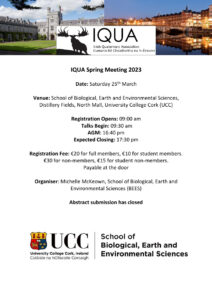
We are inviting you to our 2023 Spring Meeting at UCC on 25 March. The meeting is centered around Quaternary Research and its Societal Impact, focuses on showcasing researchers near the beginning of their careers, and will include our annual AGM. Abstracts can be sent to Michelle McKeown (mmckeown@ucc.ie) by the 3rd of March.
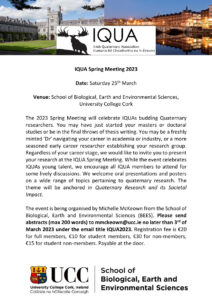
We are announcing our spring 2023 meeting! It will be hosted at University College Cork (UCC) on 25 March, and will include our annual AGM. More details to follow, but for now, make sure to save the date. Abstracts can be sent to Michelle McKeown (mmckeown@ucc.ie) by the 3rd of March. Looking forward to seeing all of you there!
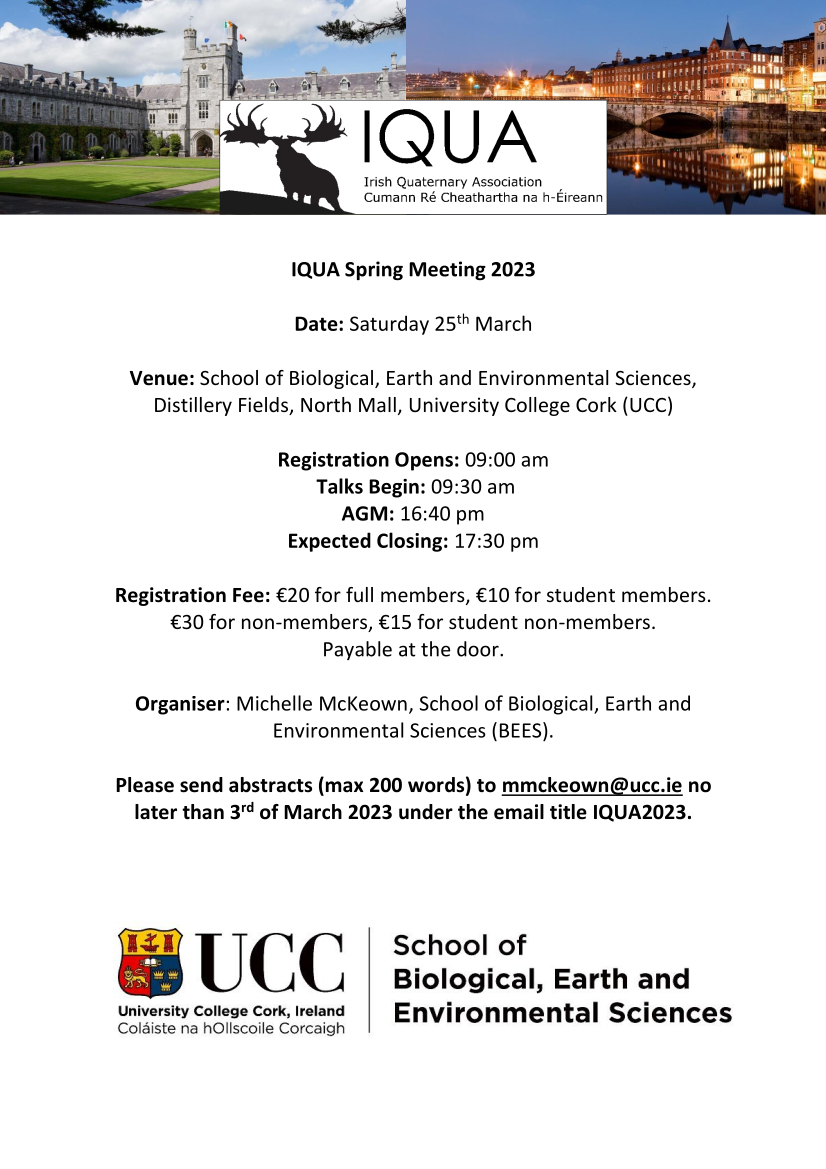
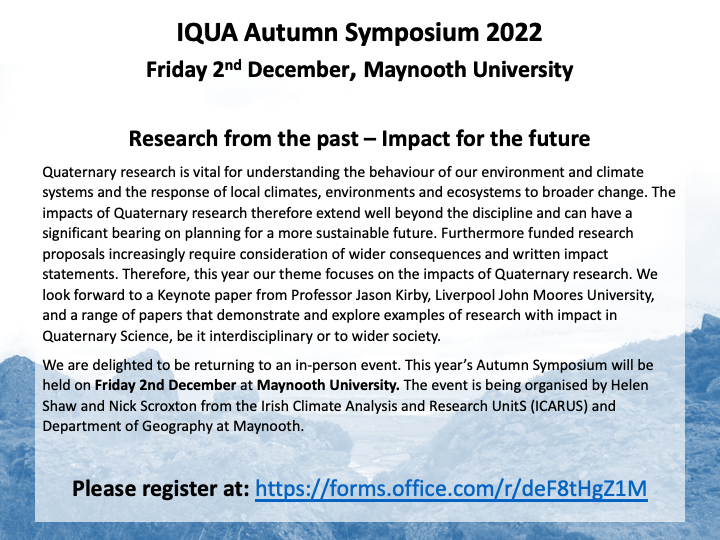
We are delighted to be returning to an in-person event. This year’s Autumn Symposium will be held on Friday, 2 December at Maynooth University. The event is organised by Helen Shaw and Nick Scroxton of the Irish Climate Analysis and Research UnitS (ICARUS) and Department of Geography at Maynooth. The theme of the symposium is Research from the past – Impact for the future.
Although registration is at the meeting we would appreciate it for our planning if you could let us know if you intend to come in the form at https://forms.office.com/r/deF8tHgZ1M
There won’t be facilities to handle card payments so would appreciate if you would bring cash.
Location: The symposium is being held at Maynooth University in the TSI building (Building 30 on the map), Room 1.25 (up the stairs to the end of the corridor). A map of Maynooth campus is here https://www.maynoothuniversity.ie/sites/default/files/assets/document/Campus%20Map%2C%20Index%20%26%20Venues%20_3.pdf
Getting here: Maynooth campus is easily accessible by train from Dublin and on the Sligo line to the west, as well as various bus services to nearby towns and the airport.
Parking: Parking on campus is limited, there are pay and display car parks listed on the map (Colour coded in blue), but they do tend to fill up quite early in the morning.
Lunch: We have reserved a table at Pugin Hall (number 16 on the map) and we hope that you will join us for lunch and discussions. Lunch is a self-service canteen style with hot and cold choices, vegetarian and (usually) vegan options. Please bring separate funds for lunch, as this is not provided as part of the registration. There are other options, from supermarket sandwiches to coffee shops and restaurants in the town, if you prefer.
Programme timings and sessions (Full programme to follow)
| 09:00-9:30 | Registration |
| 09:00-10:30 | Session 1: Irish Quaternary |
| 10:30-11:00 | Coffee break |
| 11:00-12:45 | Session 2: Sea-Level Keynote by Jason Kirby, Liverpool John Moores University |
| 12:45-14:00 | Lunch |
| 14:00-15:45 | Session 3: International Quaternary and Impacts |
| 15:45-16:00 | Close and IQUA awards and prizes |
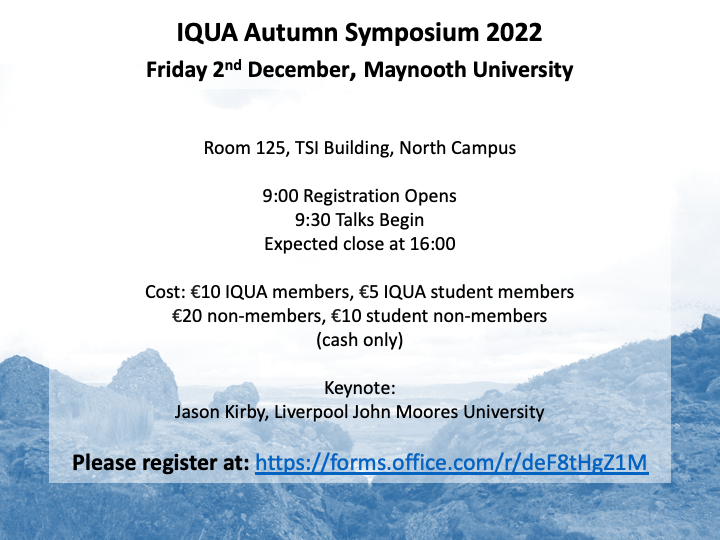
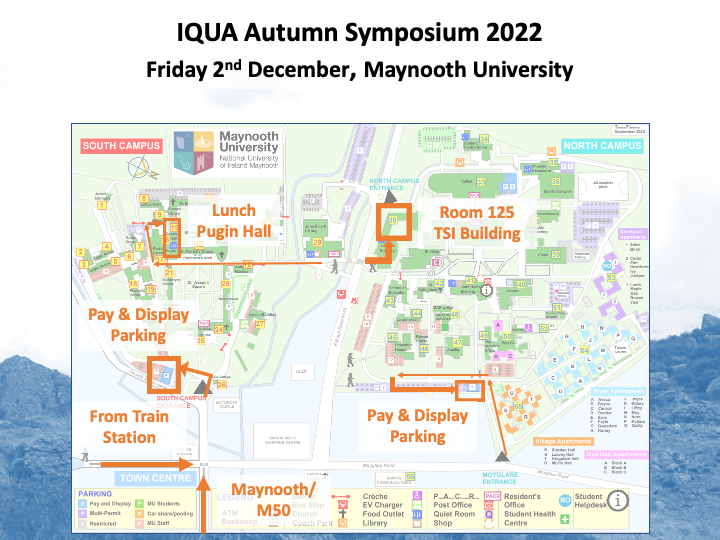
It’s been a busy Spring, but an energising one – just as Spring should be.
Susann Stolze organised an excellent field meeting in Sligo, with a focus on the Neolithic. The stunning landscape was shown at its best thanks to a spell of lovely weather, but the trip was made a success by a combination of great sites and good company. A big bualadh bos to Susann, all the contributors and all the participants for making this such a successful event.
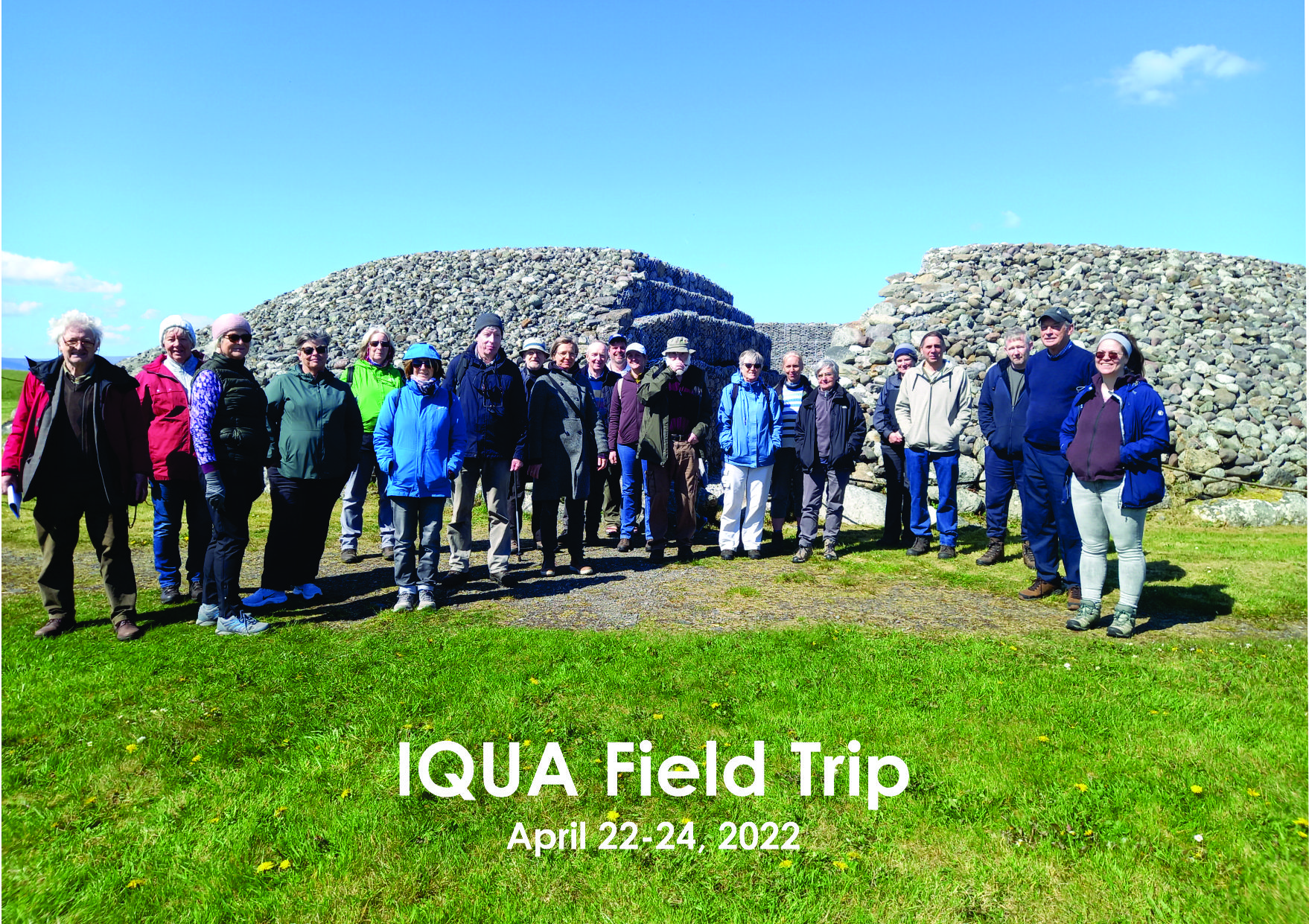
IQUA postgrad reps Ryan Smazal and Adrienne Foreman, aided by Treasurer Mark Coughlan, organised a well-attended Early Career Researcher workshop in Belfast on Friday the 29th of April 2022, supported by IQUA. The event was facilitated by Maarten Blaauw (QUB) and Niamh Cahill (U. Maynooth) and well-attended by 15 postgrads from Ireland and Britain (including at least seven nationalities by my reckoning). Many thanks to all the organisers and participants – it is wonderful to see the vibrant next generation of researchers coming through and having opportunities to meet each other.
The IQUA Spring Meeting and AGM were held in Belfast on Saturday the 30th of April 2022. The meeting included seven excellent talks (five of which by postgraduate students) and four poster presentations. The Best Postgraduate Presentation Prize was awarded to David O’Leary (NUIG) for his engaging and informative talk on “Digital soil mapping of peatlands using airborne radiometric data and supervised machine learning”. Well done all, but most especially the postgrads, for the stimulating presentations and interactions – again, it was a very pleasant change to mingle with real people! The meeting had a strong showing from IQUA early career members, and some remote engagement via MS Teams. A special thanks to Sarah Ferrandin, Helen Essell and Gosse Bootsma (all QUB) for invaluable behind-the-scenes assistance.
It is with great pleasure that we can announce our first in-person event since November 2019 in the form of the highly anticipated field meeting to Sligo organised and led by Susann Stolze. Initial plans are to meet in the Riverside Hotel in Sligo on Friday (22nd) evening, which is offering discounted prices on rooms (€50 Bed and Breakfast per person per night sharing; €50 single occupancy surcharge; ring the hotel directly on 071 919 4480, citing IQUA fieldtrip).
Click on image below for further information
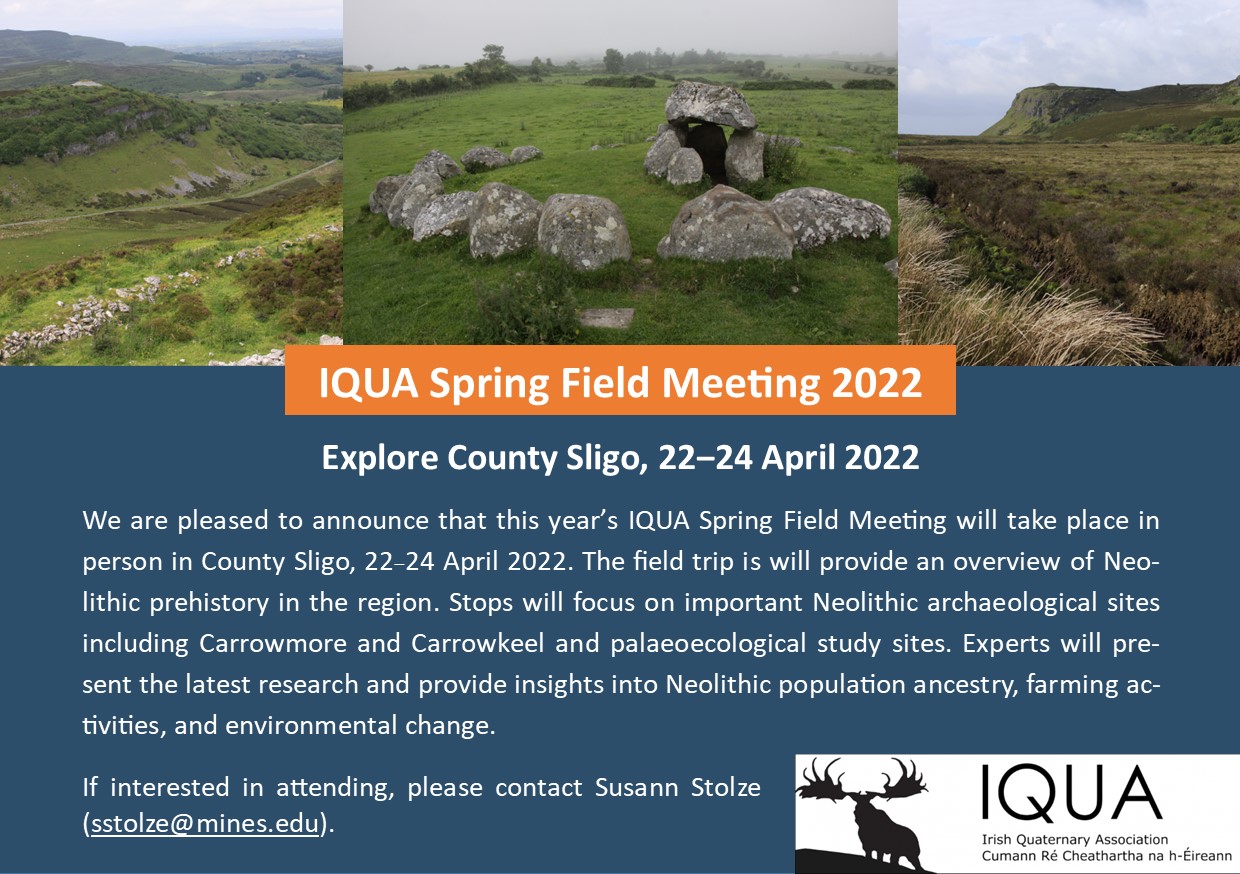
The Irish Quaternary Association Spring Meeting 2022 will be held in person at the Elmwood Building at Queen’s University Belfast on Saturday the 30th April. Registration will commence at 9:30am.
The meeting is open to all and will consist of short (20 minute) presentations on any area of new or ongoing Quaternary research. Postgraduate and post-doctoral students are especially welcome and are encouraged to take advantage of the opportunity to present in an informal and friendly setting. Both oral and poster presentations are invited and there will be a prize for the best postgraduate talk.
Please send abstracts of c. 200 words to Graeme Swindles g.swindles@qub.ac.uk, indicating poster or talk.
The meeting will be followed by the IQUA AGM on the Saturday afternoon.
There will be a small fee to pay to cover at least some of the expenses related to the meeting and to support further IQUA’s activities. The fee will be €10/€5 for members and students/concessions respectively and €20 for non-members. Payments in £GBP will also be accepted.
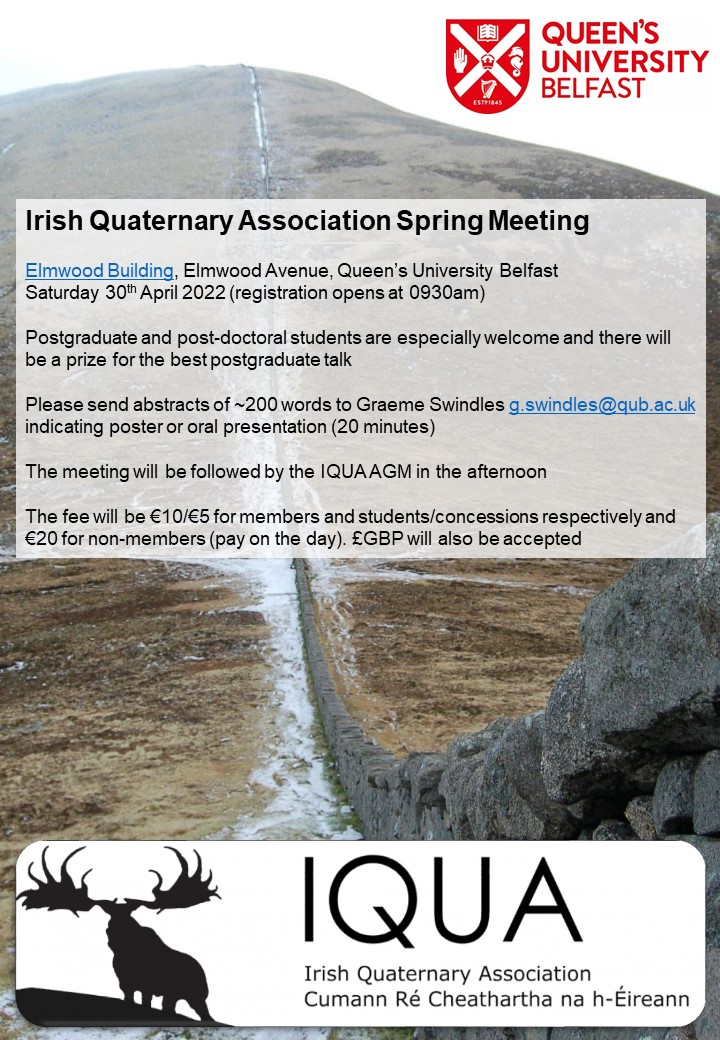
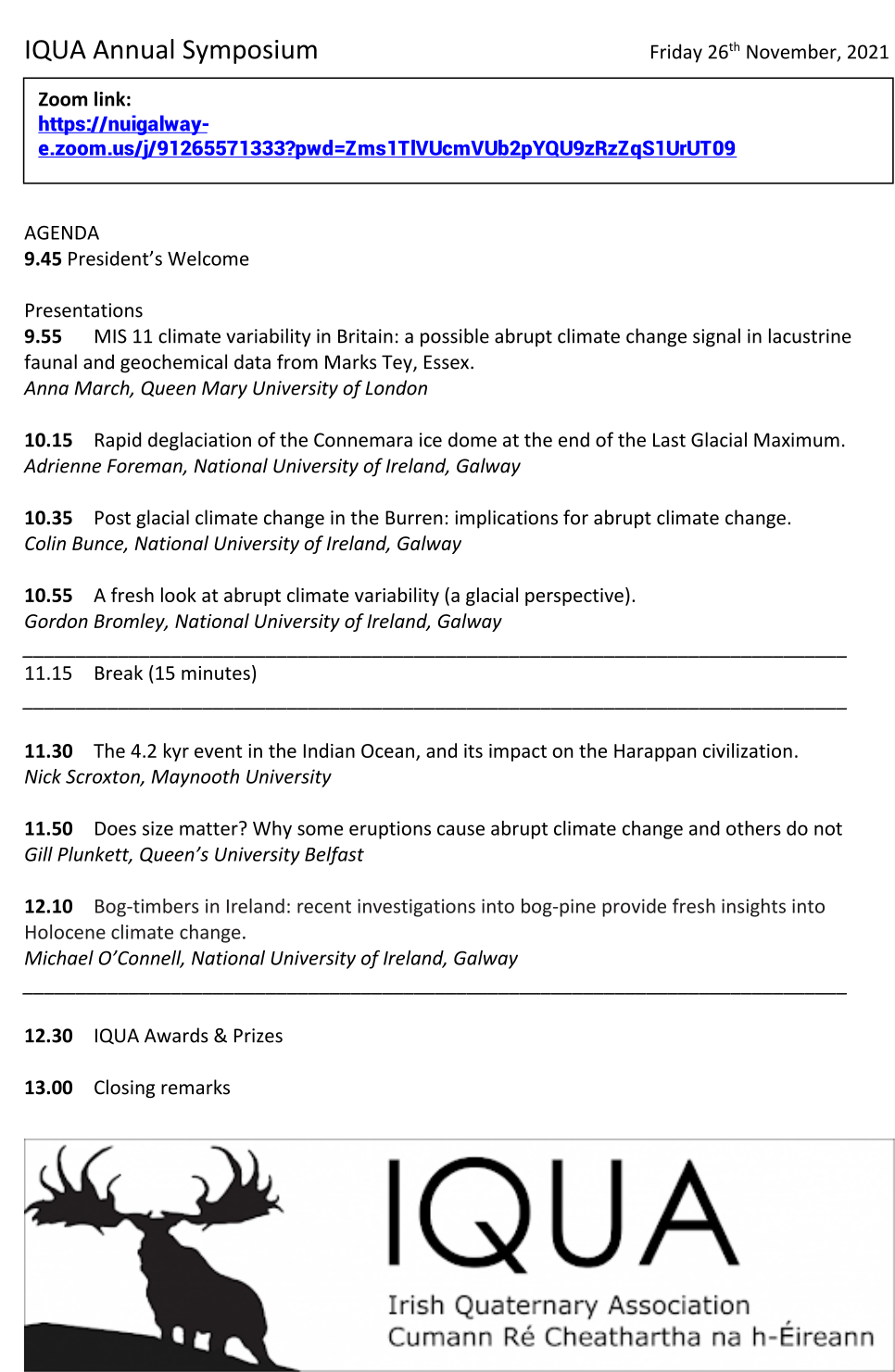
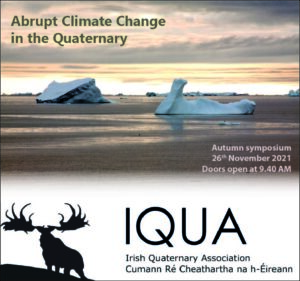
Due to the high incidence rate of COVID19 and difficulties in securing a suitable venue capable of supporting a hybrid event, this year’s Autumn Symposium will again be online. The event will be held via Zoom (details to be confirmed) on Friday, 26 November. We invite short talks (15 minutes) on the symposium theme of abrupt climate change. Please send abstracts (100-200 words) to gordon.bromley@nuigalway.ie no later than 18 November.
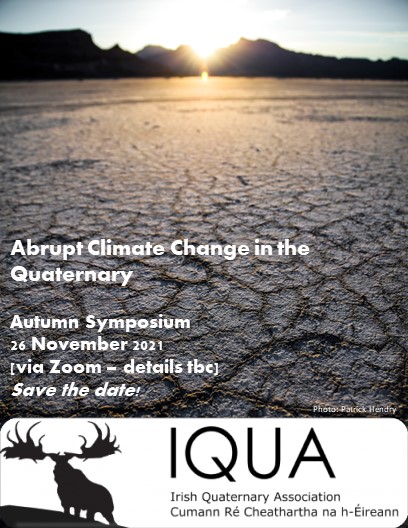
IQUA is proud to launch our new award: The Valerie Hall award for the best student or early-career researcher-led paper published by an IQUA member.
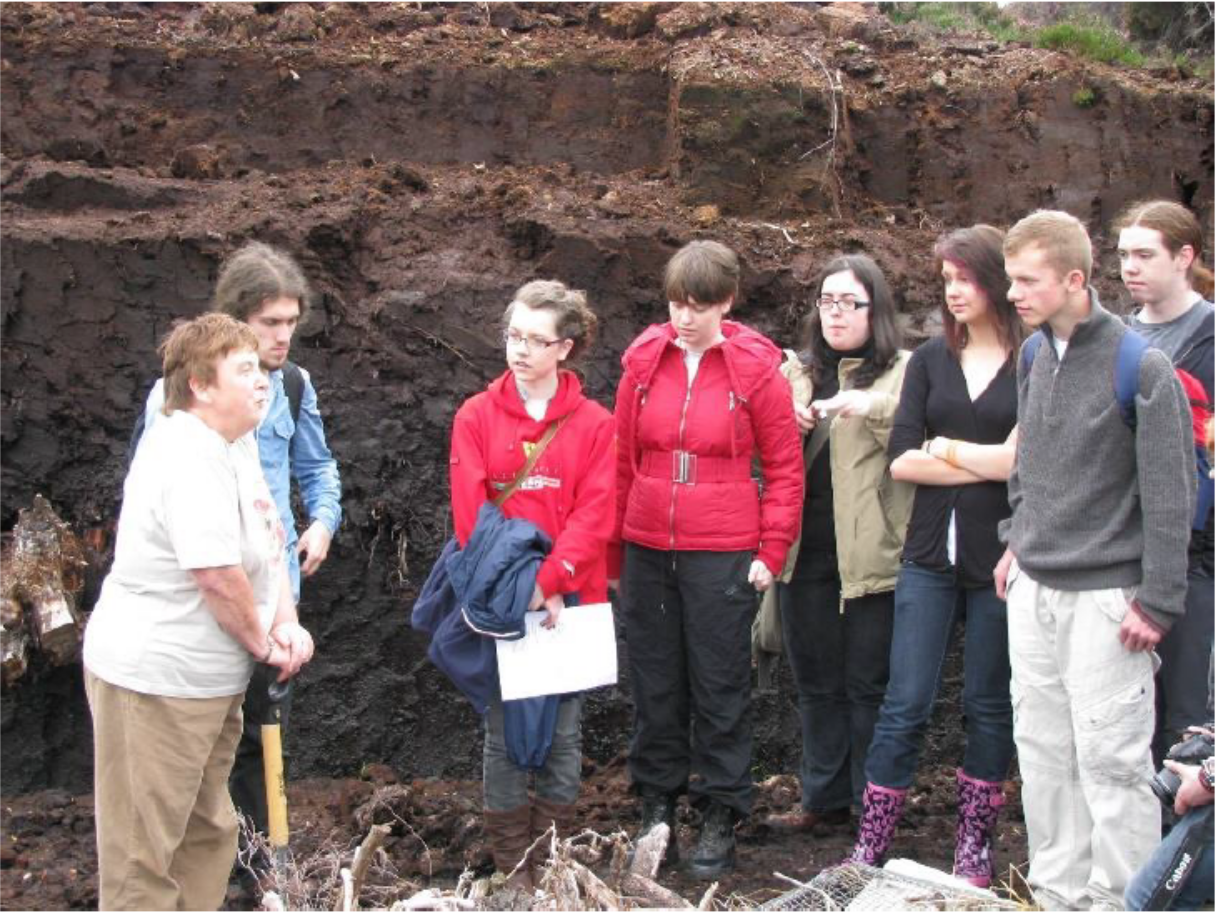
The Award is for early career researchers or postgraduate students who have written a top-quality research publication that puts Irish Quaternary science on the international stage. We hope that the award will help encourage early career researchers to consider a career in Quaternary research. One award of €250 will be given on an annual basis. Papers can be nominated by colleagues, supervisors, or other IQUA members. Nominations should be sent in writing (no more than 100 words of justification) to the IQUA secretary (Graeme Swindles – g.swindles@qub.ac.uk) for review by the IQUA executive committee before the 15th of November. The nominated paper should be attached to the email. The paper must be in the general area of Quaternary studies but does not have to be focussed on Ireland. This award is in memory of Professor Valerie Hall, who passed away in 2016. Valerie was a highly esteemed Quaternary scientist from Belfast. She began her career in botany and palynology but made a truly international mark in the field of distal tephrochronology. She was particularly supportive of PhD students and early career researchers.

The 2021 call for both the Bill Watts 14Chrono Awards and the IQUA Research Awards is now on with a deadline for application on the 15th of November.
IQUA RESEARCH AWARDS
These awards are designed to cover radiocarbon dates or laboratory fees, for instance those incurred in DNA or isotope analyses.
BILL WATTS 14CHRONO AWARDS
The Awards pay for a number of AMS radiocarbon dates for current postgraduate members of IQUA.
See our awards page for futher information and application form.